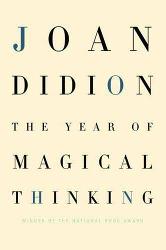 The Year of Magical Thinking
The Year of Magical ThinkingJoan Didion
At this point, most people are familiar with The Year of Magical Thinking, Joan Didion's attempt to come to terms with the grief she experienced following the death of her husband and near-fatal illness of their daughter in December 2003. I was also familiar with the general premise, but I was still unprepared for what awaited me. Didion's memoir is a clear analysis of what happens to someone after losing the most important person in one's world.
I had been wary going in to the book, as I am naturally suspicious of anyone who is able to profit from grief (this probably stems from "Professional Widow," a song by Tori Amos). This does not mean I belief grief should be private, swept under the rug, but I'm not sure I'm comfortable with someone whose grief is able to win not only the National Book Award but also lots of money in the process. However, Didion cannot help being a successful writer, and it is natural that one should turn to writing during such a time.
I have read many reviewers which criticized Didion for "name-dropping"
 in the book (for example, after John's death, she had dinner with so-and-so; while driving down this street in LA she was reminded of going with John to work on so-and-so's screenplay), but to be honest, I didn't recognize a single name she mentioned, so I wasn't really bothered by it. Again, she cannot help being a successful writer and knowing other successful people.
in the book (for example, after John's death, she had dinner with so-and-so; while driving down this street in LA she was reminded of going with John to work on so-and-so's screenplay), but to be honest, I didn't recognize a single name she mentioned, so I wasn't really bothered by it. Again, she cannot help being a successful writer and knowing other successful people.Other reviewers didn't like her lifestyle, one which is clearly upper-class: she and her husband frequently traveled the globe: Paris, London, New York, Los Angeles, and back again. However, I didn't feel she was rubbing her riches in the reader's face, as some critics have suggested; rather, Didion mentions their travels as a way of illustrating her plight: traveling almost everywhere with her husband, every major city is thus fraught with memories--is there any place on earth that will not remind her of her loss? Didion's wealth is just another reminder that money and fame do not keep tragedy at bay--we are all equal when it comes to loss.

Unfortunately, what Didion didn't know while writing the book, was that more grief was to come. Although Quintana nearly died, after a few months of recovery, it appeared she had fully recovered. This was not to be the case. Quintana died suddenly about a year following her recovery, just as this book was being published.
Illumination Factor: High. We must all face death at one time or another, and its always good to have the words of someone who suffered the same grief. However, Didion does not (in fact, cannot) offer a cure-all, a way to magically heal the pain that the death of a loved one visits on the survivor. The Year of Magical Thinking is instead one woman's way of reaching out to the world, to let other grievers know they are not alone.
In a nutshell: A work that is not altogether uplifting, The Year of Magical Thinking looks at grief head-on, and analyzes the crazy thoughts and feelings that go along with it. A book that will--unfortunately--be necessary one day.
Bibliolatry Scale: 4.5 out of 6 stars
2 comments:
Ugh, you know what? I'm glad something good will come for her out of so much tragedy. Let her make money from this book - I think the income pales in comparison to the loss, and I don't understand the griping over her making art out of life (and death).
I've had this book on my list for a while and still haven't seen it at a library.
As a writer also, I don't believe that writers become writers for money or fame...I believe it's in their blood and DNA to deal with the world through this critical self analysis. The fact that people are able to relate to her story and gain personal insight from her narrative is a wonderful uplifting thing in itself. You will always be most successful doing what you love and what God has equiped you to do. Money is not necessarily the ranking of success, but we are often fruitful when we follow our personal passions. She is brave to have put herself out there, as a writer and as a deeply wounded widow. It is certainly not an easy thing to do, although for her it felt most necessary.
Post a Comment